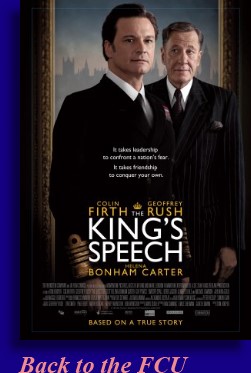




Reviewed by
Christopher Armstead


I hate to be crude, particularly when discussing such an erudite, sophisticated type of film such as Tom Hooper’s ‘The King’s Speech’ but if a woman has something so powerful and so potent that I would give up the freaking throne to be with it on the regular… then please keep it away from me. This is of course in reference the lady Wallis Simpson who had such power over the Prince Edward that he quit his day job, that being King Edward VIII of the great commonwealth of England, so that he could be with the woman he loved unencumbered until the end of his days. Just one of the many fascinating elements, elements that almost all of us know a little something about, but is expanded upon greatly in this fascinating movie.
Prince Albert (Colin Firth) has a debilitating stammer. At one time this wouldn’t have been so much of a problem as his old man King George V (Michael Gambon) points out that Royals were once just required to just look regal for photographs, but because of the newly formed BBC they have to speak quite often for all to hear. With the never wavering support of his wife Elizabeth (Helena Bonham Carter) and an endless string of voice coaches, Albert has tried his best to beat this thing, but to no avail.
Elizabeth hears of a special tutor, a Miracle Worker of sorts by the name Lionel Logue (Geoffrey Rush), a failed actor by way of Australia who just may be able to help her husband. Albert has had enough of this nonsense but it appears, at least as it is presented in this film, that resisting the wishes of the woman we will come to know as the future Queen Mother is futile.
Naturally for dramatic purposes the two men don’t hit it off all that well. Lionel insists on being familiar, Albert wants to keep thing extremely formal. Lionel is calm and breezy, Albert is uptight and hostile. The only thing they really have in common is that they are both bull headed and they both seem to walk on egg shells around their wives. Like most men I imagine.
Nonetheless great progress is made. Like a romance movie boy find boy, boy breaks up with boy and eventually the boys are forced to get back together. As we mentioned,


Edward (Guy Pearce) is going to be with Wallis (Eve Best) come hell or high water. Albert among others attempt to guide Edward into just shacking up with this twice divorced American woman but Edward wants to make her his wife. Edward cannot be King anymore. Albert must be King. Albert, or King George VI as he is christened is fearful, he can’t complete a sentence and he doesn’t believe he is king material. However his life is not his own. Complicating matters is that across the land mass there’s a guy named Hitler and he’s causing a lot of trouble and he has to be stopped. War is imminent.
Why is the King so important? George VI points out that he can pass no laws, levy no taxes and in essence is a complete and total figure head, but the people follow his lead. If there is war and the people don’t believe that their monarch is capable, competent and confidant then all is lost. George VI has one chance to convince the people that he is this man. I don’t want to spoil it for you but the Allies totally won that war so the King and his tutor must have done okay.
What is about the British Monarchy and why do these figure heads make for such interesting movie subjects? I don’t even get the whole monarchy thing which is basically state subsidized welfare for the wealthy, but you have this movie ‘The King’s Speech’ which was fantastic, Helen Mirren in ‘The Queen’ which was even better, Cate Blanchette in ‘Elizabeth’ which was a hugely entertaining movie… maybe not so much ‘The Other Boleyn Girl’ but nobody bats a thousand.
There are quite a few reasons that ‘The King’s Speech’ works so well, not surprisingly starting with the great performances given to us by both Colin Firth and Geoffrey Rush. The relationship between these two characters is a unique one, the conflict that is borne from this relationship is genuine, the importance of the task at hand is tangible and Firth and Rush present these two men to us as real live human beings. Particularly Colin Firth who has the daunting task of creating a character who is entitled, and a little pompous which I’m sure isn’t unexpected from one who is born into royalty, and while Albert has trouble getting the words out he still knows the power of words and his character lets us know the pain that these words than cause, whether he’s delivering the hurt or receiving the hurt. At the same time this entitled, pompous borderline asshole is fearful, nervous and uncertain of just about everything. Then we have to feel for this frightened, entitled character because if we don’t feel empathy for this man and his plight then the story doesn’t work. To do this we have to understand this character and that’s where Colin Firth did his best work in handling his character and translating him to the audience.
Another reason this movie works so well, as we mentioned before, there are things about these royals that we have some familiarity with, there are some things concerning these world events that we might not know anything about, but director Hooper brings all of these elements to vivid life. This movie isn’t about Prince Edward and Wallis Simpson but it is important to the story and the director handles it as such. This movie isn't about the rise of Hitler and Nazi Germany but it is important to the story, nor is the movie about young princesses Elizabeth and Margaret but their relationship to their father is near as important as anything in this movie in regards to King George VI’s and his unavoidable destiny. At least as it is told here. I’m certain a number of creative liberties were taken.
But we are not here to judge the historical accuracy of ‘The King’s Speech’, we’re just a commoner from one of the lesser colonies slated with the task of telling you why we enjoyed watching ‘The King’s Speech’. One of the best movies in the year of 2010 that really needed some decent movies to fill it out.
